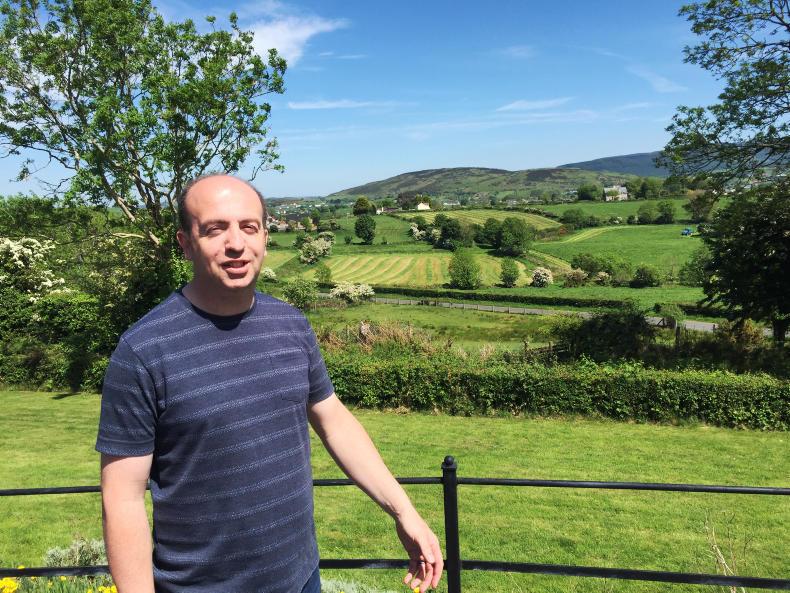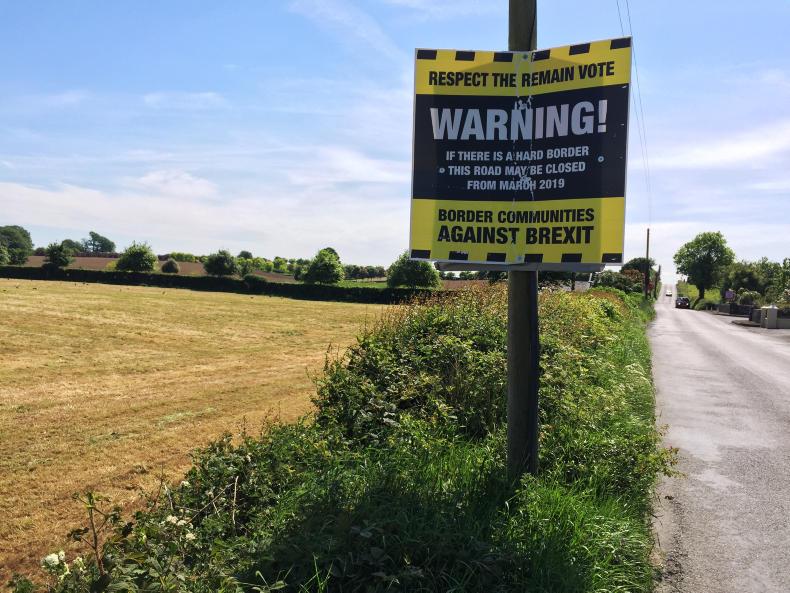Since the UK’s Brexit referendum one year ago, stark warning signs have sprung up along many country roads crossing the border between Northern Ireland and the Republic.
“If there is a hard border this road may be closed from March 2019,” they read.
They come from the group Border Communities Against Brexit, started by local business people, including suckler farmer and post office manager Damian McGinety.
“I buy straw and supplies such as feed and fertiliser in the south,” he told the Irish Farmers Journal on his farm in Dromintee, Co Armagh. Depending on the season and price trends, he travels to Dundalk or Ardee for these supplies.
Heifers from Elphin Mart
Although Northern Irish farmers including Damian have largely stopped buying cattle from the Republic because of increasingly strict country-of-origin rules, the heifers he bought to build up his 30-cow herd came from Elphin Mart five years ago.
 Damien fears the prospect of lower farm payments after Brexit and the UK’s history of cheap food imports. “We can’t compete with large-scale farming in Argentina and Brazil, US beef has hormones in it,” he said.
Damien fears the prospect of lower farm payments after Brexit and the UK’s history of cheap food imports. “We can’t compete with large-scale farming in Argentina and Brazil, US beef has hormones in it,” he said.
Potential tariffs for exports to mainland Europe are also a concern. “Offal and lesser cuts are exported,” he added. “If you look at all those factors, any one is going to cause major damage in the beef sector.”
Special status
Border Communities Against Brexit has come to the conclusion that the future border between the UK and the EU should be moved to the Irish sea, with Northern Ireland achieving a special status to continue trading under EU rules.
Damian says the Good Friday Agreement already provides the legal basis for this. He adds that it would be beneficial to other sectors trading components back and forth across the border, such as pharmaceuticals manufacturing.
Leaving a 500m-people trade area makes absolutely no sense
“It would allow European legislation around agriculture and around food, so there would be a common standard,” he said.
His group is now lobbying politicians to promote this idea, hoping for a sympathetic reception in Europe as Northern Ireland stands to lose hundreds of millions each year in CAP and structural funds from the EU.
“Northern Ireland is a high productivity area, we export a lot. Leaving a 500m-people trade area makes absolutely no sense,” Damian said.
Listen to “Brexit anniversary special” on Spreaker.
Read more
Brexit: one year on
NI machinery dealer ‘will move south’ if hard Brexit
Brexit farm payments uncertainty reaches beyond NI
‘Brexit won’t affect me’: defiance or denial?
Full coverage: Brexit
Since the UK’s Brexit referendum one year ago, stark warning signs have sprung up along many country roads crossing the border between Northern Ireland and the Republic.
“If there is a hard border this road may be closed from March 2019,” they read.
They come from the group Border Communities Against Brexit, started by local business people, including suckler farmer and post office manager Damian McGinety.
“I buy straw and supplies such as feed and fertiliser in the south,” he told the Irish Farmers Journal on his farm in Dromintee, Co Armagh. Depending on the season and price trends, he travels to Dundalk or Ardee for these supplies.
Heifers from Elphin Mart
Although Northern Irish farmers including Damian have largely stopped buying cattle from the Republic because of increasingly strict country-of-origin rules, the heifers he bought to build up his 30-cow herd came from Elphin Mart five years ago.
 Damien fears the prospect of lower farm payments after Brexit and the UK’s history of cheap food imports. “We can’t compete with large-scale farming in Argentina and Brazil, US beef has hormones in it,” he said.
Damien fears the prospect of lower farm payments after Brexit and the UK’s history of cheap food imports. “We can’t compete with large-scale farming in Argentina and Brazil, US beef has hormones in it,” he said.
Potential tariffs for exports to mainland Europe are also a concern. “Offal and lesser cuts are exported,” he added. “If you look at all those factors, any one is going to cause major damage in the beef sector.”
Special status
Border Communities Against Brexit has come to the conclusion that the future border between the UK and the EU should be moved to the Irish sea, with Northern Ireland achieving a special status to continue trading under EU rules.
Damian says the Good Friday Agreement already provides the legal basis for this. He adds that it would be beneficial to other sectors trading components back and forth across the border, such as pharmaceuticals manufacturing.
Leaving a 500m-people trade area makes absolutely no sense
“It would allow European legislation around agriculture and around food, so there would be a common standard,” he said.
His group is now lobbying politicians to promote this idea, hoping for a sympathetic reception in Europe as Northern Ireland stands to lose hundreds of millions each year in CAP and structural funds from the EU.
“Northern Ireland is a high productivity area, we export a lot. Leaving a 500m-people trade area makes absolutely no sense,” Damian said.
Listen to “Brexit anniversary special” on Spreaker.
Read more
Brexit: one year on
NI machinery dealer ‘will move south’ if hard Brexit
Brexit farm payments uncertainty reaches beyond NI
‘Brexit won’t affect me’: defiance or denial?
Full coverage: Brexit
 Damien fears the prospect of lower farm payments after Brexit and the UK’s history of cheap food imports. “We can’t compete with large-scale farming in Argentina and Brazil, US beef has hormones in it,” he said.
Damien fears the prospect of lower farm payments after Brexit and the UK’s history of cheap food imports. “We can’t compete with large-scale farming in Argentina and Brazil, US beef has hormones in it,” he said. 





 This is a subscriber-only article
This is a subscriber-only article











SHARING OPTIONS: